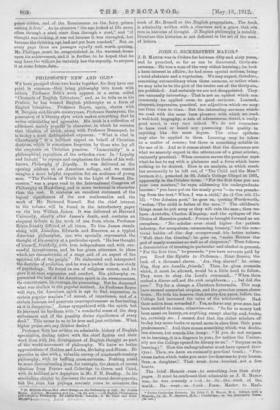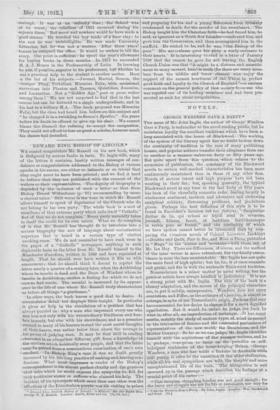JOHN C. BICKERSTETH MAYOR.* J. B. Maxon was in Orders
for between fifty and sixty years,- and ho preached, so far as can he discovered, thirty-six sermons. He was a man of the very widest learning; he took a keen interest in affairs ; he had some special notions, belug- a total abstainer and a vegetarian. We may expect, therefore, • something extraordinary when these sermons, or rather whets we may take to be the pick of the twelve out of the thirty-six, aro published. Andoertainly we are not disappointed. They are unusually interesting.- That is net an 'epithet 'which. can commonly be applied. even to good sermons.. Learned,: eloquent,impressive, practical, are adjectives swhich: we mays use from time to time. But the interesting sermons which, we read• with the same keen.,pleasure with which we read- a well-told biography,. a tale of adventurous travel, a really . good novel, is very rare indeed. We do not remember• to have read' or heard any possessing,this quality in anything like the same degree. The other epithets:. may also be applied to them. Learning may he taken us a matter of course; but there' is something notable in the use of it. And so it comes about that the discourses are what we scarcely expect in the utterances of a great scholar, eminently practical. When occasion serves the preacher says, whathe has to say with a plainness .and a force which leave, nothing to be desired. Here is an analysis, in which much has necessarily to be left out, of "The Child and the Man" (sermon iv.), preached ill St. John's 'College'. Chapel in 1881, apparently in tlueOctober term. "For the first time you are your own masters," he says; addressing his undergraduate hearers : "you have puton the manly gown "—he was preaehe ing from' the text" Whensi was a child," Ste. (1 Con xiii.
12). "Our Johnian poet;" he goes on, quoting-Wordsworth, ",writes, ' The child is father of the man.' " The children's things must be put away or they will ruin the man ; then we' have . Aristotle, Charles Kingsley, and, the epilogue of the, Choice of Hercules quoted.. Person is brought forward as 'am. exemplum.- "No., scholar ever stood higher -for . patients, industry,' for scrupulous, -unwavering honesty," but the cone, • vivial habits- of the day overpowered his better nature.
" Well that the Greek's," he , goes on, " make Hermes the, god of inanlyaixereises as well as of eloquence." Then follows, a denunciation of treating in particular and alcohol.in general., " For the first time," he proceeds, "you have servants paid by you. Road , the: Epistle to Philemon.. Hear. Seneca, the lord,, of a thousand slaves. 'Ares they slaves ?' he ..criees, Nay, they are humble: friends." Then he ••gives counaels, which, it, must be allowed, would be a little hard to follow.. They were to obey the Lord's command.. "When thou, ',nuked a dinner call not the. rich neighbours, . . list bid the poor." Try for a change a Christian Saturnalia. This may have seemed somewhat utopian, and the preacher cornea eloper home. He tells his bearers .that twentytive years ;before the, College had increased the value of the scholarships. Had their action been rewarded.? Yes,,eo fares any. poor ...man had been enabled to come; otherwiseesno. "So far as money had been spent on luxury, on anything except charity and :books,: no, certainly ,no. I cannot...find that the richer scholars of to-day buy. more books-or spend more-in alms than their poor predecessors," And then, mimes something which.was doubts, less sincere, but sounds like irony: "If you do not surpass, us in learning, it.is a. disgrace to you; for neither the Univers. city nor the. College opened its library to us.". " Surpass intim learning!" How the undergraduates must have opened their eyes 1 Then. we have an eminently practical touch s "Foe- swear taetes.which make you more .burdensome to your homes., than daughter.1! That ; must have, touched. not a few 'hearts.
The brief Memoir •runs . to something :less than sixty pages It must be confessed that admirable as J. B. Mayor. was,, he was scarcely a M ed to do. the .,work of. the' world.. He . went 'pas Sixth Form Master , to Marl- ' Twat, Cambridge Hermosa. By John C. B. Mayor, M.A. Editod, witl; Marpojr it. Y., wpm% ounbmage,, t46,,Wairodity Ppm. not..] . .
borough. It was at an Unlucky time ; the School 'was at its worst ; • the rebellion of 1851 occurred during' his nojourn there. But never and nowhere would lie have made a 'good Master. He touched' the boy' made of a finer clay; to the rest he was unItitelligible.—He was made University Librarian; hitt he was not :11:' success. 'After three years' tenure heresigned the office. It would be useless to tell the story. One point is sufficient : be spent the year's allowance for buying books• in three months. In 1872 he succeeded H. A. 3. Munro in the Professorship of Latin. In learning he wee, if possible; superior to his predecessor, bat whether he was a practical help to the student is another matter. Hero e the list of his subjects :—Juvenal, Martial, Seneca, the lounger Pliny; Tertullian; Minucius . Felix, :with- occasional excursions into Plautus and Terence, Quintilian, Ausonius, and Laetantius. Not a " Golden Age" poet or prose writer among them We are not surprised to find that in the last • ceuree but one he lectured to a single undergraduate, and in his last to a solitary. M.A. -The book: proposed was Minueius Felix, but the class had heard him before•on this subject and 4`-he changed it in a-twinkling to Seneca's _Epistles." Six years before his death he offered. to give. up, his chair. We cannot • blame the Council for refusing to accept the resignation. They could not afford•talose soz great a scholar, however much his classes' had dwindled.











































 Previous page
Previous page